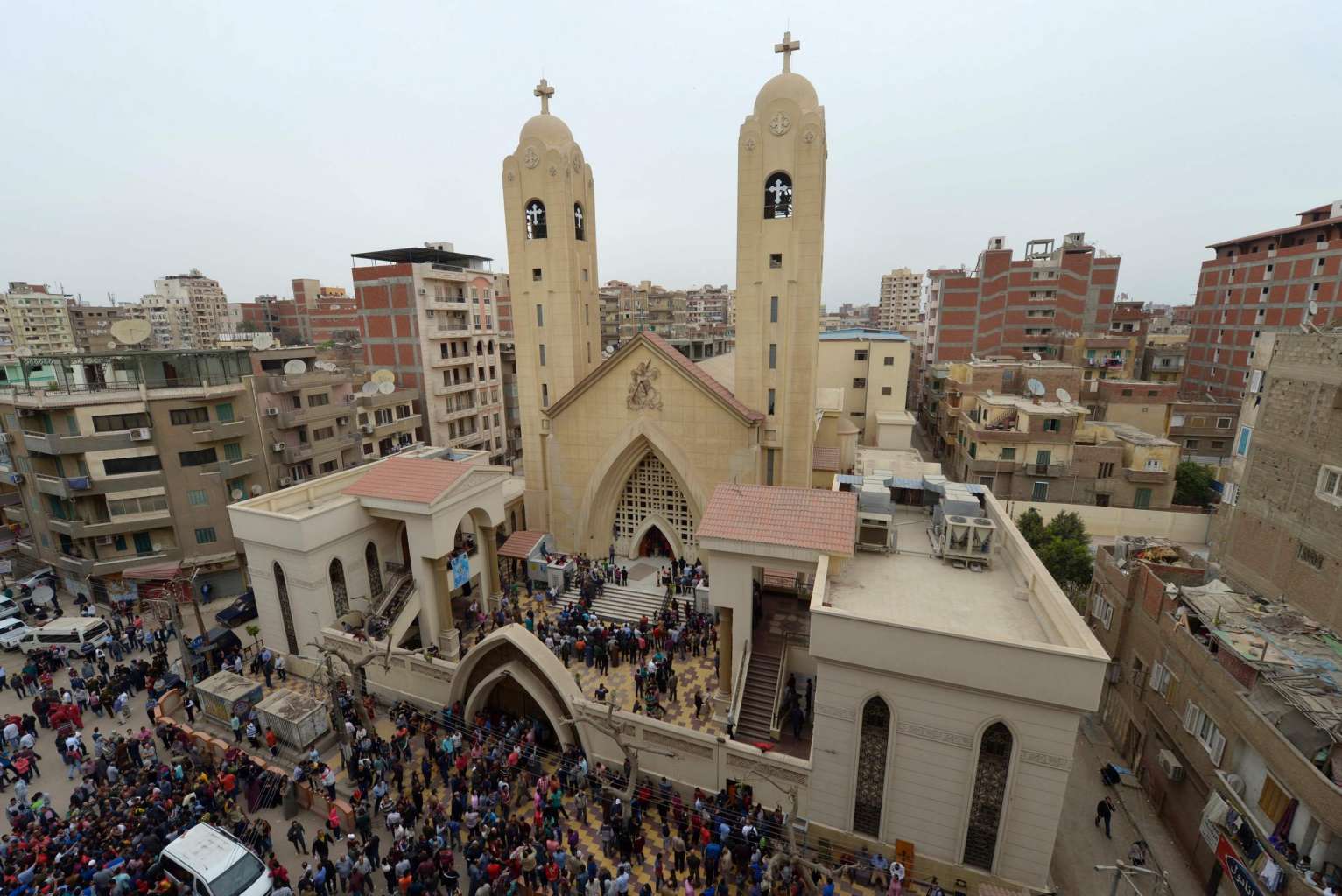Church attacks in Egypt: Who are Coptic Christians, why and how they are targeted
Sign up now: Get ST's newsletters delivered to your inbox

A general view shows people gathering outside the Mar Girgis Coptic Church in the Nile Delta City of Tanta, 120km north of Cairo, after a bomb blast struck worshippers gathering to celebrate Palm Sunday, on April 9, 2017.
PHOTO: AFP
CAIRO - The twin church attacks in Egypt on Palm Sunday (April 9) - one of the holiest days in Christianity - were among the deadliest assaults against Christians in the country in decades.
One attack struck at St. Mark's Cathedral, the seat of the Coptic Church in Alexandria, where the bomber blew himself up at the church gates. The other struck in the Nile Delta city of Tanta, where the attacker slipped past security to the front pews of the church and blew himself up, turning a religious celebration of joy into a ghastly scene of bloodshed and death.
The Islamic State in Iraq and Syria (ISIS) has claimed responsibility for the attacks, which left at least 43 people dead.
Here's what you need to know about the Coptic Christian community:
WHO ARE COPTIC CHRISTIANS?
Coptic Christians believe their Church dates back to around 50AD, when Apostle Mark was said to have brought Christianity to Egypt. This makes it one of the earliest Christian groups outside the Holy Land. The Coptic Church separated from other Christian denominations at the Council of Chalcedon (451 AD) in a dispute over the human and divine nature of Jesus Christ.
Coptic Christians make up about 10 per cent of Egypt's population of 91 million. The head of the Coptic Church is the Pope of Alexandria, who is based in Cairo.
Hundreds of Coptic monasteries once flourished in Egypt, but today only about 20 remain, as well as seven convents, according to the World Council of Churches.
The church operates primary and secondary schools throughout Egypt, as well as a Coptic museum and a theological college in Cairo.
WHY ARE THEY TARGETED IN EGYPT?
In Muslim-majority Egypt, Coptic Christians are often the victims of persecution and repeated attacks on their churches, and have a history of being marginalised by the state.
The divisions between the Muslims and the Coptic Christians were exacerbated after the Egyptian Revolution in 1952, when the military overthrew the British colony and created the Republic of Egypt. It was ultimately established as a Muslim country, and the decades that followed saw an exodus of Coptic Christians.
They face constant trouble from the Egyptian state - for example, getting permission to build churches is nearly impossible, and they are frequently openly discriminated against or lynched.
The assaults have intensified since the 2011 revolution, part of the Arab Spring uprisings, that ousted President Hosni Mubarak. Coptic churches and homes have been set on fire, members of the community have been physically attacked, and their properties have been looted, rights group Amnesty International reported in March.
The Christians largely supported the rise of President Abdel Fattah al-Sisi, who came to power after the overthrow of elected Islamist President Mohamed Morsi in 2013. After taking office, al-Sissi launched a brutal crackdown on Islamists that was supported by many Christians.
Yet anger within the Christian community towards the president is growing. After each attack in recent months, the government promised to safeguard Christians with improved security measures, only to witness another assault on the community.
HOW IS ISIS WORSENING THE SITUATION?
The ISIS, which has waged a low-level war against soldiers and police in Egypt's Sinai Peninsula for years, is now targeting Christians and broadening its reach into Egypt's mainland. That is a potential turning point in a country trying to prevent a provincial insurgency spiralling into wider sectarian bloodshed.
The militant group has also been under increasing pressure in Iraq and Syria, and thus is shifting its focus to other parts of Egypt, said analysts.
ISIS militants have attacked Coptic Christians in Egypt before, but their campaign against the minority group gathered pace in December 2016, with a Cairo church bombing that killed 29 people.
In January and February 2017, the militants killed seven Coptic Christians in Cairo, forcing dozens of Christian families to flee the Sinai Peninsula that borders Israel and the Palestinian Gaza Strip.
WHAT WERE SOME PAST ATTACKS?
February 2017: Dozens of Coptic Christian families fled northern Sinai Peninsula after suspected Islamist militants killed seven Christians.
December 2016: 25 people died when a bomb exploded at the Coptic Cathedral in Cairo during a service. ISIS said it was behind the attack.
July 2016: A Muslim mob stabbed 27-year-old Coptic Christian Fam Khalaf to death in the southern City of Minya over a personal feud. Pope Tawadros II said since 2013, there had been 37 sectarian attacks on Christians in Egypt, nearly one incident a month.
May 2016: A Muslim mob ransacked and torched seven Christian homes in Minya after rumor spread that a Christian man had an affair with a Muslim woman. The mother of the man was stripped naked by the mob to humiliate her.
April 2013: Two people were killed outside St Mark's cathedral in Cairo when people mourning the death of four Coptic Christians killed in religious violence clashed with local residents.
October 2011: Almost 30 people - mostly Coptic Christians - were killed after the army charged at a protest outside the state television building in Cairo to denounce the torching of a church in southern Egypt.
SOURCE: WASHINGTON POST, NEW YORK TIMES, AFP, ABC NEWS, BBC


